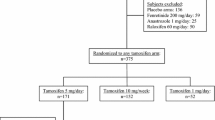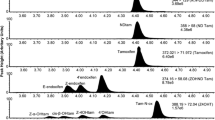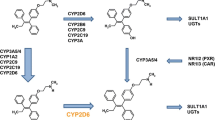Abstract
Tamoxifen is metabolized into endoxifen, a potent antagonist of the estrogen receptor, in part through cytochrome p450 (CYP) 2D6. Genotypic variation in CYP2D6 affects endoxifen levels, and some have argued that patients who do not efficiently metabolize tamoxifen might wish to consider alternative hormonal treatments. This study evaluated an algorithm in which endoxifen levels and CYP2D6 genotypes were used to make hormonal therapy recommendations for patients on adjuvant tamoxifen for breast cancer. Patients with stage I–III breast cancer who had been taking adjuvant tamoxifen for 8–56 weeks were eligible. At enrollment, baseline whole blood and serum were sent for genotyping by Amplichip and endoxifen measurement, respectively, and endoxifen levels were also measured 3 weeks later. Results were returned to oncologists along with an algorithm-generated treatment recommendation. The algorithm recommended that participants with poor metabolizer genotype and/or baseline endoxifen level <6 ng/mL consider alternative endocrine therapy. A medical record review evaluated actual treatment decisions. Of 99 patients on study, 18 (18 %) had findings that triggered algorithm-based recommendations to consider a change in endocrine therapy due to endoxifen <6 ng/mL (all 18 patients) and/or poor metabolizer CYP2D6 genotype (2 of the 18). Endoxifen levels were ≥6 ng/mL in four of them 3 weeks later. Seven (39 % of 18) switched to a different treatment (one based on toxicity, not the algorithm). Hot flash burden was not found to be significantly associated with endoxifen <6 ng/mL or genotype. Prospective testing of tamoxifen metabolism as gauged by CYP2D6 genotype and serum endoxifen levels is feasible. Future studies of tamoxifen metabolism and efficacy should consider including measurement of serial endoxifen levels. Although clinical evidence at present is insufficient to warrant routine CYP2D6 or endoxifen testing, some clinicians and patients did utilize this predefined algorithm to inform clinical decisions regarding optimal adjuvant endocrine therapy.


Similar content being viewed by others
References
Tamoxifen for early breast cancer: an overview of the randomised trials. Early Breast Cancer Trialists’ Collaborative Group (1998). Lancet 351(9114): 1451–67
Beverage JN, Sissung TM, Sion AM, Danesi R, Figg WD (2007) CYP2D6 polymorphisms and the impact on tamoxifen therapy. J Pharm Sci 96(9):2224–2231
Borges S, Desta Z, Li L, Skaar TC, Ward BA, Nguyen A, Jin Y, Storniolo AM, Nikoloff DM, Wu L, Hillman G, Hayes DF, Stearns V, Flockhart DA (2006) Quantitative effect of CYP2D6 genotype and inhibitors on tamoxifen metabolism: implication for optimization of breast cancer treatment. Clin Pharmacol Ther 80(1):61–74
Stearns V, Johnson MD, Rae JM, Morocho A, Novielli A, Bhargava P, Hayes DF, Desta Z, Flockhart DA (2003) Active tamoxifen metabolite plasma concentrations after coadministration of tamoxifen and the selective serotonin reuptake inhibitor paroxetine. J Natl Cancer Inst 95(23):1758–1764
Irvin WJ Jr, Walko CM, Weck KE, Ibrahim JG, Chiu WK, Dees EC, Moore SG, Olajide OA, Graham ML, Canale ST, Raab RE, Corso SW, Peppercorn JM, Anderson SM, Friedman KJ, Ogburn ET, Desta Z, Flockhart DA, McLeod HL, Evans JP, Carey LA (2011) Genotype-guided tamoxifen dosing increases active metabolite exposure in women with reduced CYP2D6 metabolism: a multicenter study. J Clin Oncol 29(24):3232–3239
Goetz MP, Rae JM, Suman VJ, Safgren SL, Ames MM, Visscher DW, Reynolds C, Couch FJ, Lingle WL, Flockhart DA, Desta Z, Perez EA, Ingle JN (2005) Pharmacogenetics of tamoxifen biotransformation is associated with clinical outcomes of efficacy and hot flashes. J Clin Oncol 23(36):9312–9318
Schroth W, Antoniadou L, Fritz P, Schwab M, Muerdter T, Zanger UM, Simon W, Eichelbaum M, Brauch H (2007) Breast cancer treatment outcome with adjuvant tamoxifen relative to patient CYP2D6 and CYP2C19 genotypes. J Clin Oncol 25(33):5187–5193
Lim HS, Ju Lee H, Seok Lee K, Sook Lee E, Jang IJ, Ro J (2007) Clinical implications of CYP2D6 genotypes predictive of tamoxifen pharmacokinetics in metastatic breast cancer. J Clin Oncol 25(25):3837–3845
Regan MM, Leyland-Jones B, Bouzyk M, Pagani O, Tang W, Kammler R, Dell’orto P, Biasi MO, Thurlimann B, Lyng MB, Ditzel HJ, Neven P, Debled M, Maibach R, Price KN, Gelber RD, Coates AS, Goldhirsch A, Rae JM, Viale G (2012) CYP2D6 genotype and tamoxifen response in postmenopausal women with endocrine-responsive breast cancer: the breast international group 1-98 trial. J Natl Cancer Inst 104(6):441–451
Damodaran SE, Pradhan SC, Umamaheswaran G, Kadambari D, Reddy KS, Adithan C (2012) Genetic polymorphisms of CYP2D6 increase the risk for recurrence of breast cancer in patients receiving tamoxifen as an adjuvant therapy. Cancer Chemother Pharmacol 70(1):75–81
Sestak I, Kealy R, Nikoloff M, Fontecha M, Forbes JF, Howell A, Cuzick J (2012) Relationships between CYP2D6 phenotype, breast cancer and hot flushes in women at high risk of breast cancer receiving prophylactic tamoxifen: results from the IBIS-I trial. Br J Cancer 107(2):230–233
Bonanni B, Macis D, Maisonneuve P, Johansson HA, Gucciardo G, Oliviero P, Travaglini R, Muraca MG, Rotmensz N, Veronesi U, Decensi AU (2006) Polymorphism in the CYP2D6 tamoxifen-metabolizing gene influences clinical effect but not hot flashes: data from the Italian Tamoxifen Trial. J Clin Oncol 24(22):3708–3709 author reply 3709
Madlensky L, Natarajan L, Tchu S, Pu M, Mortimer J, Flatt SW, Nikoloff DM, Hillman G, Fontecha MR, Lawrence HJ, Parker BA, Wu AH, Pierce JP (2011) Tamoxifen metabolite concentrations, CYP2D6 genotype, and breast cancer outcomes. Clin Pharmacol Ther 89(5):718–725
Henry NL, Rae JM, Li L, Azzouz F, Skaar TC, Desta Z, Sikora MJ, Philips S, Nguyen AT, Storniolo AM, Hayes DF, Flockhart DA, Stearns V (2009) Association between CYP2D6 genotype and tamoxifen-induced hot flashes in a prospective cohort. Breast Cancer Res Treat 117(3):571–575
Lorizio W, Wu AH, Beattie MS, Rugo H, Tchu S, Kerlikowske K, Ziv E (2012) Clinical and biomarker predictors of side effects from tamoxifen. Breast Cancer Res Treat 132(3):1107–1118
Lorizio W, Rugo H, Beattie MS, Tchu S, Melese T, Melisko M, Wu AH, Lawrence HJ, Nikoloff M, Ziv E (2011) Pharmacogenetic testing affects choice of therapy among women considering tamoxifen treatment. Genome Med 3(10):64
Wu AH, Lorizio W, Tchu S, Lynch K, Gerona R, Ji W, Ruan W, Ruddy KJ, Desantis SD, Burstein HJ, Ziv E (2012) Estimation of tamoxifen metabolite concentrations in the blood of breast cancer patients through CYP2D6 genotype activity score. Breast Cancer Res Treat 133(2):677–683
Roche Diagnostics (2007) AmpliChip Package Insert
Rae JM, Drury S, Hayes DF, Stearns V, Thibert JN, Hanes BP, Salter J, Sestak I, Cuzick J, Dowsett M (2012) CYP2D6 and UGT2B7 genotype and risk of recurrence in tamoxifen-treated breast cancer patients. JNCI 104(6):60–452
Dezentje VO, van Schaik RHN, Vletter-Bogaartz JM, van der Straaten T, Wessels JAM, Kranenbarg EMK, Berns EM, Seynaeve C, Putter H, van de Velde CJH, Nortier JWR, Gelderblom H, Guchelaar HJ (2013) CYP2D6 genotype in relation to tamoxifen efficacy in a Dutch cohort of the tamoxifen exemestane adjuvant multinational (TEAM) trial. Breast Cancer Res Treat 140:363–373
Conflict of interest
The authors declare that they have no conflict of interest.
Author information
Authors and Affiliations
Corresponding author
Rights and permissions
About this article
Cite this article
Ruddy, K.J., Desantis, S.D., Gelman, R.S. et al. Personalized medicine in breast cancer: tamoxifen, endoxifen, and CYP2D6 in clinical practice. Breast Cancer Res Treat 141, 421–427 (2013). https://doi.org/10.1007/s10549-013-2700-1
Received:
Accepted:
Published:
Issue Date:
DOI: https://doi.org/10.1007/s10549-013-2700-1




